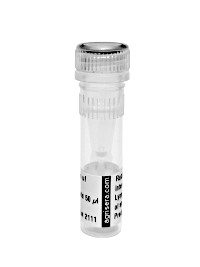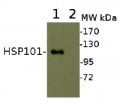1

Anti-HSP101 | ClpB heat shock protein, C-terminal
AS08 287 | Clonality: Polyclonal | Host: Rabbit | Reactivity: A. thaliana, A. tequilana, Citrus sp., C. sativus
- Product Info
-
Immunogen: Recombinant protein of Arabidopsis thaliana Hsp101/ClpB, C-terminal 145 amino acids UniProt: P42730, TAIR: At1g74310
Host: Rabbit Clonality: Polyclonal Purity: Serum Format: Lyophilized Quantity: 50 µl Reconstitution: For reconstitution add 50 µl of sterile water Storage: Store lyophilized/reconstituted at -20°C; once reconstituted make aliquots to avoid repeated freeze-thaw cycles. Please remember to spin the tubes briefly prior to opening them to avoid any losses that might occur from material adhering to the cap or sides of the tube. Tested applications: Western blot (WB) Recommended dilution: 1 : 1000 (WB) Expected | apparent MW: 101 kDa
- Reactivity
-
Confirmed reactivity: Arabidopsis thaliana, Agave tequilana, Citrus sp., Cucumis sativus L. var Krak Predicted reactivity: Citrus sinensis, Glycine max, Nicotiana tabacum, Oryza sativa, Populus trichocarpa, Triticum aestivum, Vitis vinifera Not reactive in: No confirmed exceptions from predicted reactivity are currently known - Additional Information
-
Additional information (application): When using this antibody on a new species with this antibody perform a following experiment:
prepare a leaf extract from a leaf without stress and one that has been heat stressed as follows: Take a whole leaf (in the case of plants with small leaves, like Arabidopsis thaliana), or part of a leaf and place on wet filter paper in a petri dish. Heat stress in the dark at 38°C/90 minutes to 2 hours and then allow to recover for 2 hours at room temperature in low light (leave it on the lab bench). You should be able to load 10 ug for western blotting and compare the non-heat stressed to the heat stressed sample.
Use Arabidopsis thaliana leaf as a positive control. Following such treatment 1 ug of a total protein from Arabidopsis thaliana allows detection of HSP101. - Background
-
Background: Hsp101/ClpB is a member of HSP100 protein family. These proteins help protein aggregates formed during heat stress to fall apart to allow them to be refolded by other chaperones. In spite of expression during heat stress members of HSP100 protein family are also expressed during seed development.
- Product Citations
-
Selected references: Bychkov et al. (2022) The role of PAP4/FSD3 and PAP9/FSD2 in heat stress responses of chloroplast genes. Plant Sci. 2022 Sep;322:111359. doi: 10.1016/j.plantsci.2022.111359. Epub 2022 Jun 20. PMID: 35738478.
Balfagon et al. (2018). Involvement of ascorbate peroxidase and heat shock proteins on citrus tolerance to combined conditions of drought and high temperatures. Plant Physiol Biochem. 2018 Jun;127:194-199. doi: 10.1016/j.plaphy.2018.03.029.
McLoughlin et al. (2016) Class I and II Small Heat Shock Proteins Together with HSP101 Protect Protein Translation Factors during Heat Stress. Plant Physiol. 2016 Oct;172(2):1221-1236.
Janicka-Russak et al. (2013). Modification of plasma membrane proton pumps in cucumber roots as an adaptation mechanism to salt stress. J Pant Physiol. March 14.
Janicka-Russak et al. (2012). Different effect of cadmium and copper on H+-ATPase activity in plasma membrane vesicles from Cucumis sativus roots. J. Exp. Botany, March 2012, ahead of print.
- Protocols
-
Agrisera Western Blot protocol and video tutorials
Protocols to work with plant and algal protein extracts - Reviews:
-
Damián Balfagón | 2017-11-21I had an excellent resolution of the HSP101 bands with this antibody. I used it for the species Citrus sinensis.
Accessories

AS07 253 | Clonality: Polyclonal | Host: Rabbit | Reactivity: A.thaliana, A. tequilana var. Weber,B. oleracea, N. tabacum, O. sativa, S. lycopersicum, T. aestivum, T. salsuginea, V.faba


